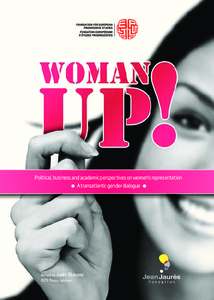"Woman up!". Political, business and academic perspectives on women’s representation. A transatlantic gender dialogue
""It is a common occurrence that gender issues are marginalised within the European political sphere." said FEPS Secretary General Ernst Stetter in the foreword of this new book which gathered the contributions of the third Transatlantic Gender Dialogue, part of the well-established a...
| Institution: | ETUI-European Trade Union Institute |
|---|---|
| Format: | TEXT |
| Language: | English |
| Published: |
Brussels
2013
FEPS |
| Subjects: | |
| Online Access: | https://www.labourline.org/KENTIKA-19119483124919376659-Woman-up!.-Political,-business.htm |
| Summary: | ""It is a common occurrence that gender issues are marginalised within the European political sphere." said FEPS Secretary General Ernst Stetter in the foreword of this new book which gathered the contributions of the third Transatlantic Gender Dialogue, part of the well-established and successful research programme on progressive feminism. The Foundation for European Progressive Studies (FEPS) has always been ready to fight this trend, putting gender equality at the top of its activity and research plan. For the fourth time in 2012, this engagement was manifested in the organisation of the transatlantic gender dialogue, the research towards it and following it up. This dialogue is entitled Woman up! as the message needs to be sent that discussing gender roles should be included in the long-term rethinking and the renewal process of social democracy. For changing gender roles according to a progressive vision and dealing with the still alarmingly wide gender inequalities, there is a need to Woman up!
The main topic of the 2012 seminar was the representation of women in political life and business, with an insight to academia. With this choice for topic, FEPS have contributed to the Europe-wide debate launched by the European Commission. Parallel, in the United States the article of Anna-Marie Slaugther entitled Why women dtill can’t have it all? has launched a massive public debate on how gender roles are changing, but policies do not follow this change.
It seems from the great number of the pledges in this book, that the title has greatly inspired the authors. The book opens with a chapter on how the frame in which we discuss gender roles have changed and needs to be further transformed. Monique Halpern deliberates on “old problems, new questions” indeed on the basis of Ms. Slaughter’s article. Sandra Willett Jackson then continues by reflections on new forms of subtle sexism that limit the public sphere for women in the United States. Karolina Leakovic then denounces and invites us to fight against the discriminatory deal of the phenomenon she calls double shifts for women and join the previous authors in their reflection on reconciling private and professional life. Finally, on the example of Greece Maria Stratigaki raise consciousness on the devastating effects of the economic crisis, which led to an increasing populism and extremism and by this trend affected the society’s perception of gender roles in a negative manner.
The second chapter is dedicated to analyse women’s representation in political life. Denise Baer gives an exhaustive overview of the American struggles by giving both good and bad examples, she points out that depending on their design, quotas can have both a mobilising, but also demobilising effect. Pia Locatelli continues by looking back critically at her professional career and based on her experience she lists the basic elements of achieving parity. Barbara Lawton invites us to get out of our safety zone and proposes an immediate best practice with the combination of two American initiatives aimed at supporting women for achieving in politics.
The issues of women’s representation in business life are tackled in the third chapter. Elizabeth Ballantine shares her personal experience and reveals the importance of mentors throughout her career. Isabella Lenarduzzi clarifies a few myths linked to women’s advancement in business and reflects on alternatives differing from the traditional career path. Susan Ness advocates for shifting from mentorship to sponsorship and brings up examples on why this latter concept is more suitable for increasing the number of women in the top level of management as well.
The fourth chapter analyses gender representation in the academic field. Alison E. Woodward takes a look at diverse factors which have contributed to the success of quotas in scientific decision making. Laura L. Frader examines institutional transformation in academia through the programmes STRIDE and ADVANCE. Nevertheless, achieving equal representation also necessitates redefining expectations and emotions. Andrea Pet? writes about the “heavy luggage of interiorized outside expectations”. Finally, Judit Tánczos gives an overview about the main issues of the seminar and relaunches the cycle for the fifth transatlantic gender dialogue." |
|---|---|
| Physical Description: | 140 p. Digital |

